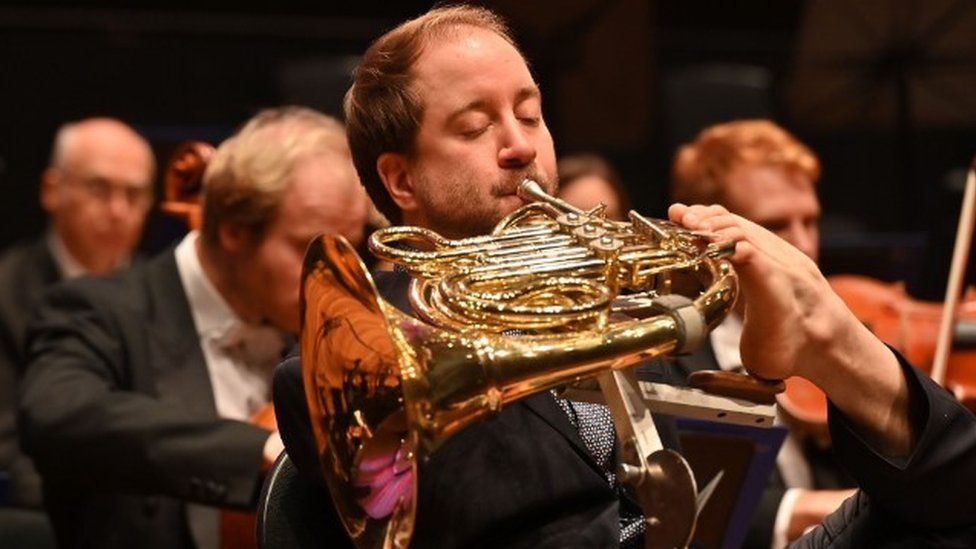ARTICLE AD BOX
 Image source, Bournemouth Symphony Orchestra
Image source, Bournemouth Symphony Orchestra
By Beth Rose
BBC Access All
Look at the BBC Proms poster this year and you'll spot some classical big-hitters - the conductor Sir Simon Rattle and cello superstar Sheku Kanneh Mason. But look closer still and you'll clock a suave French horn player…and his toes. Felix Klieser has been described as a virtuoso and has performed all over the world, but born without arms he plays the instrument with his left foot.
"It was a little miracle," Felix says, that he became a French horn player at all.
Not because of his limb difference but because when he asked to learn the instrument, aged four, his family had no idea what he was talking about.
"I'd never been to a concert, I'd never met a horn player and in my family there was no one making music. My parents said: 'Err, what is a French horn?" he told the BBC's Access All podcast.
His family did some research and lucked out. In the German city of Göttingen, where Felix grew up "there was one music school and at the music school there was one horn teacher".
Felix enrolled and a life-time of problem solving began.
Questions rapidly stacked up. How would he play an instrument that requires one hand to support the horn and the other to create the sound? Without fingers, how would he use the valves to change the note?
At first it wasn't a problem at all. As a child Felix could sit on the floor and reach the mouthpiece with someone holding the horn.
As he grew, he worked with a "creative person who can build strange things" to develop a stand which holds the instrument in place.
As for the lack of fingers, Felix realised he could kick his left leg up and angle his foot to use his dexterous toes just as well.
The position is an impressive sight, even to Felix.
"When I see myself it looks very interesting and very spectacular. But when I play by myself it's a very comfortable position," he says. "It's something I can do for hours."
The biggest challenge was not an obvious physical one, it was making the French horn actually sound like a French horn.
It consists of a 12ft brass tube, which curls round into an open "bell" where the sound comes out. Horn players put their right hand in the bell to create the familiar, haunting, sound you might have heard in popular film music like Jurassic Park.
Without a hand to put in the bell, Felix realised he would have to create the tone entirely through the way he played.
"There was no teacher who could teach you how to play the horn in this way. It was more trial and error. I've just my lips, I've just my air," he says.
"You have to control the air in a different way and take care of the position of your lips, of your tongue. This was maybe the most challenging thing, I practised a lot."
This technique sets Felix apart from other players.
He was recognised very early on in his studies as exceptional by any standard, but even those closest to him doubted he would be accepted into the classical music world.
LISTEN: You can hear more from Felix on the BBC Access All podcast.
As a teenager, Felix studied at Hanover University of Music, Drama and Media and won a prestigious prize. At the time, he and his teacher were interviewed for a newspaper.
The reporter asked Felix if he planned on a professional career.
"My answer was something like: 'Maybe it could be possible, I don't know because I'm still at school''."
Then his teacher, a famous player, interrupted him. "It's a good hobby for you, but you will never be a professional horn player. Never, never, never. You don't have the right hand, and the bell works differently. It will never work'."
Image source, Felix Kiesler
It was a sliding doors moment for Felix, who abruptly and unexpectedly learned life offers you two options.
"You have to decide, should I try to show that it is possible or should I give up? These situations happen quite often in my life," he says.
Rather than strive to become a professional musician, Felix simply wanted to "play the French horn as good as possible," and see how far that would take him.
It has taken him all over the world, to the south coast of England where he recently completed a two-year residency with the Bournemouth Symphony Orchestra and even on tour with the singer, Sting.
But he says the biggest lesson he learned goes back to his early years.
"The most important thing, when I grew up, is to learn to solve problems," he says.
"I never knew what is possible for me and what is not possible. But when you have a way of thinking, 'Ok, I can solve every problem,' then you have many, many possibilities in your life.
"And this is not a question of having a disability or not, because in the end all of us has something where he or she thinks 'Ok, there is a limit'."
Felix faced a serious challenge recently. One that is relatable to all of us - getting through the Covid-19 pandemic.
As a professional musician, he went from having a full concert schedule to nothing.
"I stopped practising because it was not necessary anymore," he says. "Then I bought a PlayStation and did a lot of PlayStation," using the controller with his toes.
One day it occurred to him: "Maybe it's a little bit sad for my horn to be in the case and not to be useful anymore?"
He took it out and they became re-acquainted. After all these years together he gave it a name - Alex. He even bought some googly eyes to bring Alex to life.
Image source, Felix Kiesler
Then he cast his eyes around and wondered what non-musical activities Alex could get involved with if he wasn't being played - cooking was the first to come to mind and to entertain his online followers.
Even now with a full concert schedule once again, Alex lives a very fulfilled and varied life for a horn.
It has been a fun way to connect with fans all over the world but some will get to watch Felix play in London when he takes to the stage at the Royal Albert Hall for his BBC Proms debut on 2 and 3 August.
He will perform Mozart's Horn Concerto No. 4.
"I'm excited," he says. "For me the most important thing is to get to know the audience here.
"When you're young and start a career then you're looking to play with famous conductors, famous orchestras. But right now I want to play music for people to make the world a little bit more beautiful."
You can listen to the podcast and find information and support on the Access All page.

 1 year ago
19
1 year ago
19








 English (US)
English (US)